FlannO’Brien and Catholicism Part 2
by Michael Patrick O'Leary
Manichaeism
Hell is near Tullamore
Someone described O’Brien as having “the visage of a satanic cherub”. Many writers have described O’Brien’s version of Catholicism as ‘Manichean”. The Iranian philosopher Mani posited a radical dualism of good and evil, independent cosmic powers of Light and Darkness. The world was a mixture of good and evil in which spirit represents Light and matter represents Darkness. Since ancient times, Iranian religion has deeply influenced a number of the world’s faith traditions, especially Christianity and late Judaism. Richard Foltz has demonstrated how Buddhist influences were significant in the formation of Mani’s religious thought. The transmigration of souls became a Manichaean belief.
Anthony Cronin, O’Brien’s friend and biographer, wrote that a remarkable thing about O’Brien’s writing was the way a “view if the dominance of evil coincides with and reinforces the innate nihilism of the comic vision”.
Sartre wrote that hell is other people.
In Marlow’s Dr Faustus, Mephistopheles says:
Why this is hell, nor am I out of it.
Think’st thou that I who saw the face of God,
And tasted the eternal joys of Heaven,
Am not tormented with ten thousand hells,
In being depriv’d of everlasting bliss?
Cronin quotes Aidan Higgins’s theory that the landscape of The Third Policeman is that of the Irish midlands and that “hell is situated somewhere near Tullamore”.
Cronin warns that O’Brien would not necessarily have consciously developed a Manichean world-view because he lived in a country where Catholics “did not ‘think things out”. Cronin asserts that O’Brien would have absorbed a received religion where everything one needed to know was in Aquinas’s synthesis of Aristotelian philosophy and Catholic doctrine, Summa Theologica. However, Cronin believes that by the time he wrote The Dalkey Archive, O’Brien had thought about, albeit in an unstructured fashion, the Manichean view of existence.
Eric Mader-Lin wrote:
“Along with an ambiguous dedication to the tenets of High Modernism, O’Brien’s best work showed a creative imagination torn between Roman Catholicism on the one hand, and a corrosive, almost nihilistic cynicism on the other…Wasn’t it perhaps the case that the human world was as it was because the Devil was more in control of it than God? Or was it maybe true instead that God and the Devil were equally powerful beings and that the world was a kind of battlefield? If so, how was the battle being waged? Was the outcome truly already decided? How could one reliably distinguish between good and evil when the world was so thoroughly shot through with both?”
“His constant need to remind readers just where things really stand here and now after the Fall. The teeming scene of history is certainly not one of progress, but rather of our degraded state repeatedly making itself obvious. Only liars and fools could pretend otherwise.”
This comes across as a kind of humorous pessimism about human nature and human institutions, including the Catholic Church. As Cronin puts it, “self-interest, self deception, hypocrisy and fraud bulk large in all human affairs; and however much Myles na gCopaleen might devote himself to exposing them, his basic assumption is that they will continue to do so; nor does he ever show any gleam of admiration or enthusiasm for the countervailing modes of human behaviour, be they gallant, generous, visionary or, come to that, rational”.
Hell is too good for Irish politicians.
A 1954 production of Faustus Kelly
In the play Faustus Kelly, Kelly is a publican and chairman of the local council. He recruits The Stranger as a rate collector, and, with his help, is elected to parliament. There are strong hints that The Stranger is The Devil. Irish politics proves too dirty even for the devil who feels betrayed by the politicians and tears up his contract with Kelly. “Not for any favour…in heaven or earth or hell…would I take that Kelly and the others with me to where I live, to be in their company forever and ever…I WANT NOTHING MORE OF IRISH PUBLIC LIFE! I’m tired. I’m going home”.
Hell is too good for Irish politicians.
The Third Policeman
The blurb on my tattered old copy of this book describes The Third Policeman as:”A murder thriller, a hilarious comic satire about an archetypal village police force, a surrealistic vision of eternity, a tender, brief, erotic story about unrequited love affair between a man and his bicycle and a chilling fable of unending guilt”.
In a letter to William Saroyan, O’Brien gave his own plot summary of The Third Policeman:
“When you get to the end of this book, you realize that my hero or main character (he’s a heel and a killer) has been dead throughout the book and that all the queer ghastly things which have been happening to him are happening in a sort of hell which he earned for the killing. Towards the end of the book (before you know he’s dead) he manages to get back to his own house where he used to live with another man who helped in the original murder. Although he’s been away three days, this other fellow is twenty years older and dies of fright when he sees the other lad standing in the door. Then the two of them walk back along the road to the hell place and start through all the same terrible adventures again, the first fellow being surprised and frightened at everything just as he was the first time and as if he’d never been through it before.”
As the narrator says to Sergeant Pluck:
“Your talk is surely the handiwork of wisdom because not one word of it do I understand”. The narrator is reacting to the sergeant’s peculiar obsession with bicycles and his puzzlement prompts the policeman to expound his “atomic theory”.
“Everything is composed of small particles of itself and they are flying around in concentric circles and arcs and segments and other innumerable geometrical figures too numerous to mention collectively, never standing still or resting but spinning away and darting hither and thither and back again, all the time on the go. These diminutive gentlemen are called atoms…
They are as lively as twenty leprechauns doing a jig on top of a tombstone.
…Consecutively and consequentially, you can safely infer that you are made of atoms yourself and so is your fob pocket and the tail of your shirt and the instrument you use for taking the leavings out of the crook of your hollow tooth.
Do you happen to know what takes place when you strike a bar of iron with a good coal hammer or a blunt instrument?…When the wallop falls, the atoms are bashed away down to the bottom of the bar and compressed and crowded there like eggs under a good clucker…Some of the atoms of the bar will go into the hammer and the other half into the table or the stone or the particular article that is underneath the bottom of the bar…
The gross and net result of it is that people who spent most of their natural lives riding iron bicycles over the rocky roadsteads of this parish get their personalities mixed up with the personalities of their bicycle as a result of the interchanging of the atoms of each of them and you would be surprised at the number of people in these parts who nearly are half people and half bicycles.”
“When a man lets things go so far that he is half or more than half a bicycle you will not see so much because he spends a lot of his time leaning with one elbow on walls or propped by one foot on kerbstones. Of course there are other things connected with ladies and ladies’ bicycles that I will mention to you separately some time. But the man-charged bicycle is a phenomenon of great charm and intensity and a very dangerous article.”
“The behaviour of a bicycle that has a high content of humanity is very cunning and highly remarkable. You never see them moving by themselves but you meet them in the least accountable places unexpectedly. Did you never see a bicycle leaning against the dresser of a warm kitchen when it is pouring outside…?
No-one ever caught them with a mouthful of steak. All I know is that the steak disappears…It is not the first time I have noticed crumbs at the front wheels of some of these gentlemen.”
“If you let it go too far it would be the end of everything. You would have bicycles wanting votes and they would get seats on the county council and make the roads far worse than they are for their own motivation. But against that and on the other hand, a good bicycle is a great companion, there is a great charm about it.”
Bicycles in Tamil Nadu – or are they?
This is rather similar to Buddhist science. “A mass substance is formed by the union of atoms. But in such a union, the atoms do not maintain individuality. The threads of abstract elements existing in each atom penetrate into the neighbouring atoms, and as such, a mass of substance is a large group of atoms with the threads of each of the atoms interclasped in, interwoven with, and interpenetrated through the threads of the other atoms in the neighbourhood.”
William Saroyan wrote: “Joe had been explaining things in the meantime. He said it was again the beginning of the unfinished, the re-discovery of the familiar, the re-experience of the already suffered, and the fresh-forgetting of the unremembered. Hell goes round and round. In shape it is circular, and by nature it is interminable, repetitive and very nearly unbearable.” This sounds like the Buddhist concepts of dukkha and samsara and the goal of nibbana. There could be a pre-echo of Groundhog Day.
There is a lot of “science” in The Third Policeman that would bring pain to the brains of Heisenberg, Schrödinger or Gödel, as the narrator expounds the theories of the esoteric savant, de Selby. There are copious footnotes, sometimes going on for several pages. “De Selby had some interesting things to say on the subject of houses.” He defined houses as large coffins. “The softening and degeneration of the human race he attributes to its progressive predilection for interiors and waning interest in the art of going out and staying there.” What we call “night” according to de Selby is an accumulation of black dust brought about by volcanic activity. He attributes the notion that the earth is spherical to the fact that human beings are continually moving in only one known direction and that this direction is around the circular circumference of an earth which is sausage-shaped.
Canadian Catholic literary critic Hugh Kenner, in an essay called “The Fourth Policeman” (by which he meant O’Brien’s Catholic sensibility) claimed that O’Brien suppressed the book because it offended his own “explicitly formed and highly orthodox conscience”.
To be continued.

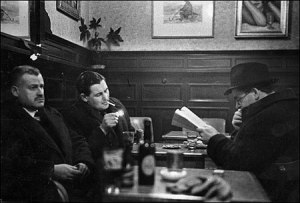
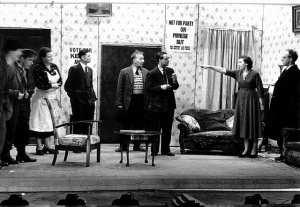
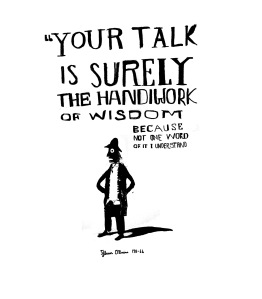
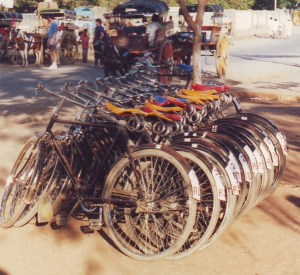
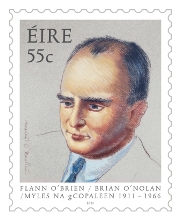
I’m a great fan, particularly of the Third Policeman. When I was much, much younger I went to Kilburn to see The Brother, a one-man stage show in celebration of O’Brien’s work, put on by Eamon Morrissey. Brilliant. There are very few occasions that I’ve laughed so much that I was in pain. People were literally falling out of their seats. I’ll always treasure that night, as well as my scruffy collection of 3 or 4 paperbacks.
“Now, let me explicate and explain this to ye – the truth is, the Brother can’t look at an egg�”
Interesting article. All best, Steve
LikeLike
Thanks Steve. I deeply regret that I never managed to see Eamon Morrissey although I often read about the show in Time Out.
LikeLike
Loved this Padraig, though admit I had to re-read the first half with an online dictionary open in another tab. Only ever having a rather fleeting acquaintance with the humanities/theology, some of the terminology you used bamboozled me rather, though happy to report I got there in the end. The second half was altogether easier and therefore (for me) more fluently understood and enjoyed. I had no idea of the friendship between Saroyan and O’Brien though it doesn’t surprise me, heroes both.
Since our house move, as I vouchsafed before, our books are still packed up until we decide how to configure the space in our new small city centre flat. I’m itching to lay hands on these lovely books now, but will be lightly killed if I go plundering the boxes before we have shelving of any sort, so I will have to continue to be patient. Reading your articles reassures me the wait will have been worth it 🙂
LikeLike
Thanks Jacqui. Whatever happened to Saroyan (his reputation I mean). When I were a lad I used to read him a lot. Now he seems to have been forgotten.
LikeLike
[…] penned entirely in the form of a Mylesian pub conversation). [1] Padraig Colman, in a fine series of detailed tributes, sums him up dispassionately as “a morose drunk who led an uneventful life […]
LikeLike